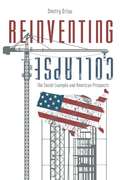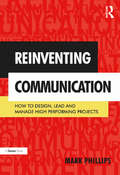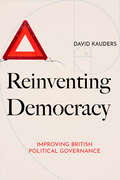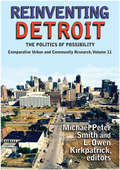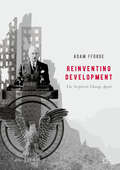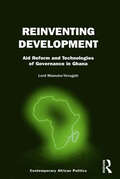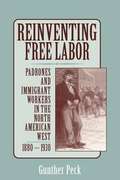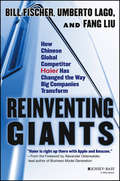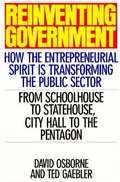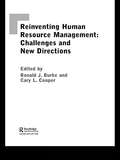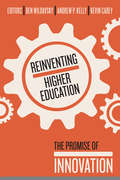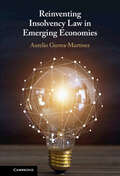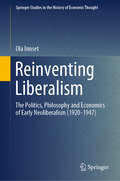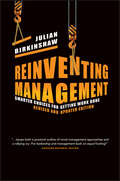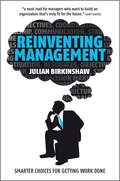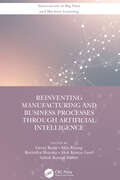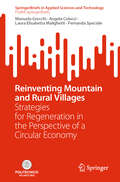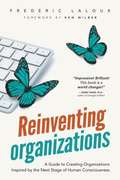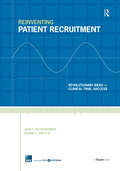- Table View
- List View
Reinventing Collapse
by Dmitry OrlovThis new edition of Reinventing Collapse is an update on the growing similarities and differences between the collapse of the Soviet Union and the current unraveling of the United States. With sharp wit and dry humor, Dmitry Orlov shares his personal experiences in post-industrial living and argues that US collapse is survivable given the right attitude and preparation.
Reinventing Communication: How to Design, Lead and Manage High Performing Projects
by Mark PhillipsIn his ground-breaking book, Reinventing Communication, Mark Phillips shows how even the most mature organization can fail to deliver successful projects - and worse, how this can lead to an organization's demise. With clear examples, Mark reveals the underlying principles at work and introduces a revolutionary new technique for harnessing the power of communication to ensure long term success. For organizations of all sizes, this book changes the way we think about management and leadership. Mark makes his case by looking at teams and individuals that set out to deliver ambitious achievements in complex and challenging environments. We meet the leadership team that built the F-18 Super Hornet fighter jet, one of the US Navy's most successful programs. We discover the untraditional approach to risk used in building a new terminal at London's Heathrow airport. We draw lessons on corporate survival from the cat and mouse fight against IED's in Afghanistan, and are introduced to a website where online video gamers solved a critical piece of the AIDS puzzle using their gaming prowess. Reinventing Communication is about creating the conditions for performance and attaining long term success. Whether a start-up, a global enterprise or a government agency, this book shows us how to deliver ambitious achievements by getting communication right. It is a book that no manager, leader or innovator should be without.
Reinventing Democracy: Improving British political governance
by David KaudersDemoracy is ubder threat. 90% of electors want political reform. But how to escape the mess? Britain should adopt a federal structure with a written constitution and an elected apolitical People's Council replacing autocratic and ineffective bodies, and preventing a slide to autocracy or worse. The United Kingdom needs fundamental change. Already we see that Labour are not thinking strategically about the causes of British decline. Tackling symptoms without the root causes is unlikely to be effective. Britain faces major challenges: •The climate crisis •An over-centralised State that cannot cope with the complexity of the twenty-first century •A tax base that favours oligarchs at the expense of the people •Determination to carry on the way things have always been done - "Nothing changes" •Putting right the continuing damage done by a hard Brexit This book offers one possible solution. It's meant to move the country's thinking forward. The book calls for major reforms like implementing federalism, creating a written constitution, establishing a People's Council, and redefining the monarchy's role. It investigates the failures within the system, poor policy decisions, and the negative impacts of neo-liberal policies, proposing solutions to improve democracy, economic performance, and international status. Only the people can bring about change. This book is a starting-point for discussion. Read the book now if you would like UK society and governance improved. Ignore the book if you are happy with everything the way it is. There is much waiting for you to discover, including the first-draft written constitution of the UK.
Reinventing Detroit: The Politics of Possibility (Comparative Urban And Community Research Ser.)
by Michael Peter SmithThis book addresses the questions of what went wrong with Detroit and what can be done to reinvent the Motor City. Various answers to the former-deindustrialization, white flight, and a disappearing tax base-are now well understood. Less discussed are potential paths forward, stemming from alternative explanations of Detroit's long-term decline and reconsideration of the challenges the city currently faces. Urban crisis-socioeconomic, fiscal, and political-has seemingly narrowed the range of possible interventions. Growth-oriented redevelopment strategies have not reversed Detroit's decline, but in the wake of crisis, officials have increasingly funnelled limited public resources into the city's commercial core via an implicit policy of "urban triage." The crisis has also led to the emergency management of the city by extra-democratic entities. As a disruptive historical event, Detroit's crisis is a moment teeming with political possibilities. The critical rethinking of Detroit's past, present, and future is essential reading for both urban studies scholars and the general public.
Reinventing Development
by Adam FfordeThis book debunks the foundations of contemporary government-led development policy. The author questions the predictability of success when using mainstream development doctrines and its underlying assumptions, approaching development from a sceptical standpoint, as opposed to the more common optimistic view. The book uses international development and aid as a case study of how rich countries define how change should happen. Further, it suggests alternative ways of thinking about and organizing social change.
Reinventing Development: Aid Reform and Technologies of Governance in Ghana (Contemporary African Politics)
by Lord Mawuko-YevugahGlobal development actors such as the World Bank and the International Monetary Fund claim that the shift to the poverty reduction strategy framework and emphasis on local participation address the social cost of earlier adjustment programs and help put aid-receiving countries back in control of their own development agenda. Drawing on the case of Ghana, Lord Mawuko-Yevugah argues that this shift and the emphasis on partnerships between donors and poor countries, local participation, and country ownership simultaneously represents a substantive departure from earlier versions of neo-liberalism and an attempt by global development actors and local governing and social elites to justify, and legitimize the neo-liberal policy paradigm. This book shows how the new architecture of aid has important implications in three distinct but related ways: the discursive construction and production of post-colonial societies; the changing focus of Western aid and development policy interventions; and the reproduction of the politics of inclusive exclusion. The author provides detailed and original research on the new development paradigm and develops a critical theoretical approach to re-think conventional analyses of the new discourses on aid whilst offering a fresh, alternative interpretation of changes in international aid relations.
Reinventing Ericsson
by Daniela Beyersdorfer Das NarayandasCarl-Henric Svanberg, CEO of the Swedish telecom infrastructure company Ericsson, has to reorganize the recovering company in late 2003 after a major industry downturn. He is convinced that only a more market-orientated and customer-focused organization will be able to remain competitive in this maturing, high-technology focused industry. Presents his change project, in which the sales and marketing structure play a central role. Will his ideas allow the company to keep its customers and successfully go after new markets?
Reinventing Fire: Bold Business Solutions for the New Energy Era
by Amory LovinsOil and coal have built our civilization, created our wealth, and enriched the lives of billions. Yet, their rising costs to our security, economy, health, and environment now outweigh their benefits. Moreover, that long-awaited energy tipping point—where alternatives work better than oil and coal and compete purely on cost—is no longer decades in the future. It is here and now. And it is the fulcrum of economic transformation.A global clean-energy race has emerged with astounding speed. The ability to operate without fossil fuels will define winners and losers in business—and among nations.In Reinventing Fire, Amory Lovins and Rocky Mountain Institute offer a new vision to revitalize business models, end-run Washington gridlock, and win the clean-energy race—not forced by public policy but led by business for enduring profit. This groundbreaking roadmap reveals market-based solutions across the transportation, building, industry, and electricity sectors. It highlights pathways and competitive strategies for a 158%-bigger 2050 U.S. economy that needs no oil, no coal, no nuclear energy, one-third less natural gas, and no new inventions.This transition would cost $5 trillion less than business-as-usual—without counting fossil fuels&’ huge hidden costs. It requires no new federal taxes, subsidies, mandates, or laws. The policy innovations needed to unlock and speed it need no Act of Congress.Whether you care most about profits and jobs, national security, health, or environmental stewardship, Reinventing Fire charts a pragmatic course that makes sense and makes money. With clarity and mastery, Lovins and RMI point out the astounding opportunities for enterprises to create the new energy era.Drawing praise from President Bill Clinton, former National Security Advisor Robert McFarlane, and a host of others, Reinventing Fire has piqued the interest of world leaders, business leaders, and political strategists.
Reinventing Free Labor: Padrones and Immigrant Workers in the North American West, 1880-1930
by Gunther PeckOne of the most infamous villains in North America during the Progressive Era was the padrone, a mafia-like immigrant boss who allegedly enslaved his compatriots and kept them uncivilized, unmanly, and unfree. In this first-ever history of the padrone, Gunther Peck argues that they were not primitive men but rather thoroughly modern entrepreneurs who used corporations, the labor contract, and the right to quit to create far-flung coercive networks. Drawing on Greek, Spanish, and Italian language sources, Peck analyzes how immigrant workers emancipated themselves using the tools of padrone power to their own advantage.
Reinventing Giants: How Chinese Global Competitor Haier Has Changed the Way Big Companies Transform
by Bill Fischer Umberto Lago Fang LiuA compelling profile of an emerging Chinese competitor Chinese firms are reinventing their business models, their corporate cultures, and themselves, becoming global competitors who increasingly offer knowledge rather than cheap labour in their quest to join the ranks of the "world's best" companies. This book offers a compelling profile of the most ambitious of these emerging Chinese competitors, the Haier Corporation (the world's largest manufacturer of home appliances), and shares insights on how one organization has repeatedly reinvented its business model and corporate culture in an effort to sustain its success. Reinventing Giants provides an exclusive look within the Haier Corporation and shows how managerial accountability and responsibility have been repositioned at every level of the organization, with the core value of market-centricity, while aligning strategy on each level of management. It includes actual work reports that show this process in detail from the ground up. The authors emphasize how a belief in the liberation of employee talent has consistently been the driving force underlying Haier's success. Includes the remarkable story of Haier's turnaround and how these lessons can be applied to other organizations Contains information for any company grappling with competition in the global marketplace Shows how to liberate employees' talent to drive business success Written by Bill Fischer, Professor of Innovation Management at IMD in Switzerland, Umberto Lago, Professor of Management at Bologna University, Italy, and Fang Liu, Research Associate of IMD Reinventing Giants helps global managers rethink their own business models and accompanying corporate cultures in order to be able to apply Haier's lessons directly to their own organizations.
Reinventing Government in the Information Age: International Practice in IT-Enabled Public Sector Reform (Routledge Research in Information Technology and Society #Vol. 1)
by Richard HeeksWill information technology help reinvent government? It might, but only if it is correctly managed. This book provides a new model for management of information age reform, based on international case-studies drawn from the US, UK, mainland Europe, and developing countries. It offers practical guidance and analytical insights and will be of value to practitioners, students, educators and researchers in both public administration and information systems.
Reinventing Government: How the Entrepreneurial Spirit Is Transforming the Public Sector
by David Osborne Ted A. GaeblerA revolution is stirring in America. People are angry at governments that spend more but deliver less, frustrated with bureaucracies that give them no control, and tired of politicians who raise taxes and cut services but fail to solve the problems we face.
Reinventing HRM: Challenges and New Directions
by Cary L. Cooper Ronald J. BurkeThe human resources (HR) field is in a time of format and self-reflection. This significant text directly addresses the reasons why human resource management has not received its due. It asks: What can be done about this? Why is it critical to continued organizational performance and innovation? What are its benefits? The authors review the most current thinking on HR initiatives associated with organizational performance and investigate how the field will need to mobilize in new ways to meet the demand of this period of time. With contributions from key thinkers, this is one of the most important books on HRM available.
Reinventing Higher Education: The Promise of Innovation
by Ben Wildavsky Kevin Carey Andrew P. KellyThe inspiration for this timely book is the pressing need for fresh ideas and innovations in U.S. higher education. At the heart of the volume is the realization that higher education must evolve in fundamental ways if it is to respond to changing professional, economic, and technological circumstances, and if it is to successfully reach and prepare a vast population of students--traditional and nontraditional alike--for success in the coming decades. This collection of provocative articles by leading scholars, writers, innovators, and university administrators examines the current higher education environment and its chronic resistance to change; the rise of for-profit universities; the potential future role of community colleges in a significantly revised higher education realm; and the emergence of online learning as a means to reshape teaching and learning and to reach new consumers of higher education. Combining trenchant critiques of current conditions with thought-provoking analyses of possible reforms and new directions, Reinventing Higher Education is an ambitious exploration of possible future directions for revitalized American colleges and universities.
Reinventing Higher Education: The Promise of Innovation
by Ben WildavskyThe inspiration for this timely book is the pressing need for fresh ideas and innovations in U.S. higher education. At the heart of the volume is the realization that higher education must evolve in fundamental ways if it is to respond to changing professional, economic, and technological circumstances, and if it is to successfully reach and prepare a vast population of students—traditional and nontraditional alike—for success in the coming decades. This collection of provocative articles by leading scholars, writers, innovators, and university administrators examines the current higher education environment and its chronic resistance to change; the rise of for-profit universities; the potential future role of community colleges in a significantly revised higher education realm; and the emergence of online learning as a means to reshape teaching and learning and to reach new consumers of higher education. Combining trenchant critiques of current conditions with thought-provoking analyses of possible reforms and new directions, Reinventing Higher Education is an ambitious exploration of possible future directions for revitalized American colleges and universities.
Reinventing Insolvency Law in Emerging Economies
by Aurelio Gurrea-MartínezThis book explains how and why insolvency law in emerging economies needs to be reinvented. It starts by examining the importance of insolvency law for the promotion of economic growth as well as the similarities and divergences in the design of insolvency law around the world. The central thesis of the book is that insolvency law in emerging economies fails to serve as a catalyst for growth. It is argued that this failure is mainly due to the design of an insolvency legislation that is not tailored to the market and institutional environment generally existing in emerging economies. The book also provides a critical analysis of the design of insolvency law in many advanced economies where the insolvency system has proven to be unattractive for debtors, creditors or both. Therefore, in addition to suggesting a new insolvency framework for emerging economies, this book ultimately invites readers to rethink insolvency law.
Reinventing Liberalism: The Politics, Philosophy and Economics of Early Neoliberalism (1920-1947) (Springer Studies in the History of Economic Thought)
by Ola InnsetIn April 1947, a group of right-leaning intellectuals met in the Swiss Alps for a ten-day conference with the aim of establishing a permanent organization. Named “an army of fighters for freedom” by Friedrich Hayek, they would at times use “neoliberalism” as a description of the philosophy they were developing. Later, many of them would opt for "classical liberalism” or other monikers. Was their liberalism classical or was it new? All new creeds build on previous ones, but the intellectuals in question were involved in an explicit attempt to change liberalism and move beyond both past laissez-faire ideals and the social liberalism popular at the time. This book provides a contextual, historical understanding of the development of neoliberal ideas, by studying its evolution from the first socialist calculation debates in Red Vienna to the founding meeting of the Mont Pelerin Society in 1947. The author examines key neoliberal conceptions of totalitarianism, market mechanisms and states, and presents a detailed study of the discussions during the first meeting of the Mont Pelerin Society. Offering a new perspective on the ideas that have influenced economics and politics since the 1970s, this study appeals to scholars interested in modern and political history, political theory and the history of economic thought. "What is neoliberalism? In search of an answer, Innset’s innovativeintellectual history takes us to a grand hotel overlooking Lake Geneva, and inside the first meeting of the Mont Pèlerin Society. Our journey leaves us with a deeper understanding of the new form of liberalism that is the legacy of this closed society." Edward Nik-Khah, Professor of Economics, Roanoke College “Reinventing Liberalism will put an end to endless debates around whether neoliberalism exists or not. Ola Morris Innset clearly shows that it does and presents a definitive argument for what neoliberalism is. This book is a must read for all those who want to have a solid understanding of the ideology that is framing and increasingly visibly endangering our world....” Marie Laure Salles-Djelic, Sciences Po Paris
Reinventing Management
by Julian BirkinshawThe recent economic crisis was not just caused by a failure of regulation or economic policy; it was a story of the failure of management in a fundamental sense-a deeply flawed approach to management that encouraged bankers to pursue opportunities without regard for their long-term consequences, and to put their own interests ahead of those of their employers and their shareholders. And looking more widely, there is a creeping disenchantment with management as a profession: surveys show that managers generate less respect than lawyers and bankers in the eyes of the general public, and there are few if any positive role models for management. "Change isn't just for the rank-and-file anymore; it's coming for you. Instant access to information and global resources have changed the world we live and work in. Julian Birkinshaw shows that 19th century industrial management won't work in a 21st century fluid workplace. Read this, or prepare to be 'game-changed' by someone who has. " -Jack Hughes, CEO, TopCoder "Technological and social changes are having an enormous impact on the world of business, and on the way companies are managed. In this book, Julian Birkinshaw provides a roadmap for making sense of how the world of management is changing, and he provides useful advice for companies who want to harness the potential that Web 2. 0 has to offer. " -PV Kannan, CEO, 24/7 Customer "Julian Birkinshaw helps us look beyond our legacy management practices, and imagine bold new ways of leading, managing and organizing. Filled with mind-expanding examples, Reinventing Management is a must read for managers who want to build an organization that's truly fit for the future. " -Gary Hamel, bestselling author of The Future of Management
Reinventing Management: Smarter Choices for Getting Work Done
by Julian BirkinshawThe recent economic crisis was not just caused by a failure of regulation or economic policy; it was a story of the failure of management in a fundamental sense—a deeply flawed approach to management that encouraged bankers to pursue opportunities without regard for their long-term consequences, and to put their own interests ahead of those of their employers and their shareholders. And looking more widely, there is a creeping disenchantment with management as a profession: surveys show that managers generate less respect than lawyers and bankers in the eyes of the general public, and there are few if any positive role models for management. "Change isn't just for the rank-and-file anymore; it's coming for you. Instant access to information and global resources have changed the world we live and work in. Julian Birkinshaw shows that 19th century industrial management won't work in a 21st century fluid workplace. Read this, or prepare to be 'game-changed' by someone who has." —Jack Hughes, CEO, TopCoder "Technological and social changes are having an enormous impact on the world of business, and on the way companies are managed. In this book, Julian Birkinshaw provides a roadmap for making sense of how the world of management is changing, and he provides useful advice for companies who want to harness the potential that Web 2.0 has to offer." —PV Kannan, CEO, 24/7 Customer "Julian Birkinshaw helps us look beyond our legacy management practices, and imagine bold new ways of leading, managing and organizing. Filled with mind-expanding examples, Reinventing Management is a must read for managers who want to build an organization that's truly fit for the future." —Gary Hamel, bestselling author of The Future of Management
Reinventing Manufacturing and Business Processes Through Artificial Intelligence (Innovations in Big Data and Machine Learning)
by Ashok Kumar Dubey Geeta Rana Ravindra Sharma Alex Khang Alok Kumar GoelThis edited book describes how newly emerging Artificial Intelligence (AI) technologies will provide unprecedented opportunities to penetrate technology and automation into everything we do, and at the same time, provide a huge playing field for businesses to develop newer models to capture market share. It establishes a milestone in understanding global transformational changes occurring in the manufacturing and corporate world due to AI and tries to find powerful and sophisticated solutions that will improve and streamline operations. Reinventing Manufacturing and Business Processes Through Artificial Intelligence will be of interest to students, researchers, and professionals of the AI community as well as interdisciplinary researchers.
Reinventing Mountain and Rural Villages: Strategies for Regeneration in the Perspective of a Circular Economy (SpringerBriefs in Applied Sciences and Technology)
by Angela Colucci Manuela Grecchi Laura Elisabetta Malighetti Fernanda SpecialeThis book explores problems generated by the abandonment of mountain villages, which also represented strategic sites for guarding against environmental hazards, and proposes a process of regeneration and upgrade of the built environment, with a view to a circular economy and social and economic development. It provides principles, methods, and tools supporting the design and management of the regeneration of abandoned mountain/rural villages and presents the transferable results of multidisciplinary applied research involving several local contexts and compares methodological and technical design solutions developed in successful practices. The book consists of six chapters that address specific issues in the regeneration process of depopulated mountain villages.
Reinventing Organizations: A Guide to Creating Organizations Inspired by the Next Stage of Human Consciousness
by Frederic LalouxIn this book, the author shows that every time humanity has shifted to a new stage of consciousness in the past, it has invented a whole new way to structure and run organizations, each time bringing extraordinary breakthroughs in collaboration. Reinventing Organizations" describes in practical detail how organizations large and small can operate in this new paradigm. Leaders, founders, coaches, and consultants will find this an engaging handbook, full of insights, examples, and inspiring stories.
Reinventing Patient Recruitment: Revolutionary Ideas for Clinical Trial Success
by Joan F. Bachenheimer Bonnie A. BresciaDuring the last five years, clinical research and development costs have risen exponentially without a proportionate increase in the number of new medications. While patient recruitment for clinical studies is only one component in the development of a new medicine or treatment, it is one of the most significant bottlenecks in the overall drug development process. Now it is imperative that industry leaders see beyond reactive measures and recognize that advancing their approach to patient recruitment is absolutely essential to advancing medicine and continuing the stability of their corporate brand across the globe. Reinventing Patient Recruitment: Revolutionary Ideas for Clinical Trial Success is a definitive guide to planning, implementing and evaluating recruitment strategies and campaigns globally. The combined experience of the authors provides a depth of perspective and boldness of innovative leadership to set the standards for future patient recruitment programs and practices. This book is a must-have for pharmaceutical, biotechnology and medical device industry professionals concerned with enrolling for domestic and multinational clinical studies and remaining on time and on budget.
